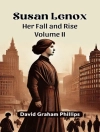In ‚Esther, ‚ Henry Adams crafts a rich narrative that intertwines themes of identity, morality, and the societal constraints of the late 19th century. Through the lens of a young woman’s struggle for autonomy amidst the rigid structures of her time, Adams employs a literary style that is both deeply introspective and evocative, drawing the reader into the psychological landscape of his protagonist. The novel serves not only as a character study but also as a reflection on the philosophical dilemmas of its era, particularly the tensions between individual desire and social obligation. Henry Adams, an esteemed historian and member of the prominent Adams political family, found himself influenced by the transformative social changes and intellectual currents of his lifetime. His background, steeped in American political history and philosophy, undoubtedly informed his exploration of gender roles and personal agency in ‚Esther.‘ The complexities of his own life experiences, coupled with his keen observations of societal evolution, drive the profound commentary embedded within this work. This book is highly recommended for readers interested in American literature, feminist ideas, and the nuanced interplay of personal and societal narratives. Adams’s ‚Esther‘ not only enriches our understanding of its time but also resonates with contemporary discussions on identity and freedom, making it a timeless addition to any literary collection.
Über den Autor
Henry Adams (1838–1918), a descendant of two U.S. presidents, was an eminent American historian and author known for his deep insights into the complexities of political and social change. An exemplar of literary excellence in the Progressive Era, Adams carved out a distinctive niche through his blend of historical writing and philosophical contemplation. Best known for his autobiography, ‚The Education of Henry Adams‘, which won a Pulitzer Prize posthumously in 1919, he showed a keen grasp of the interplay between personal experience and larger historical forces. In ‚Esther‘ (1884), Adams turned to fiction to explore the societal tensions wrought by the clash of art, religion, and modernity. The book is set in the Gilded Age, a period which Adams examined with acuity, highlighting social norms and interpersonal dynamics within the refinements of upper-class society. This novel, though perhaps less recognized than his autobiographical and historical works, reveals his subtlety in character development and his pervasive skepticism concerning the direction of American culture. Adams’s literary style is characterized by an intricate, often ironic prose that draws readers into the intellectual and emotional undercurrents of his era. A key figure in American letters, Adams’s work continues to be admired for its analytical depth and eloquent representation of the human condition in the face of transformative historical events.












